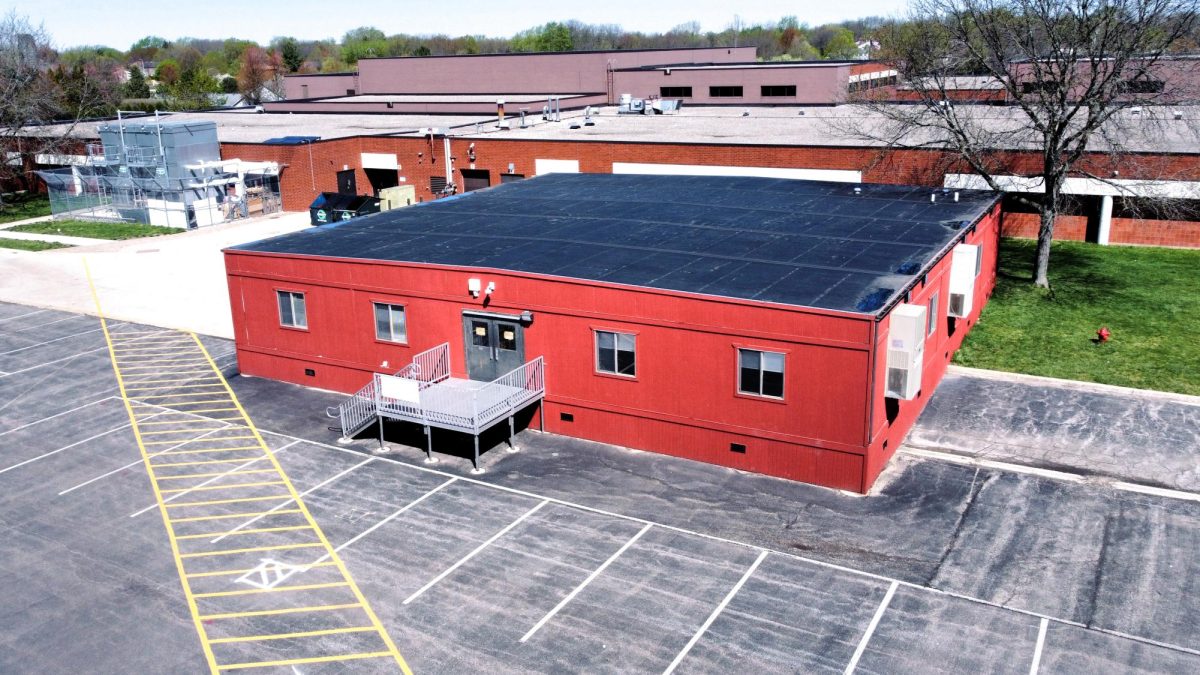From Champaign to Evanston, school districts across Illinois have cut their gifted magnet programs, which separate academically talented students from their peers and provide them with more challenging curriculum.
District 203’s own magnet program, Project Idea Plus (PI+), serves students in fourth through eighth grade. PI+ students attend Meadow Glens Elementary and Kennedy Junior High schools, as opposed to their home school.
In order to gain entrance to PI+, students must score highly across a range of aptitude tests (MAP, CogAT, IOWA), and the Figural Torrance Test of Creative Thinking. PI+ runs from fourth through eighth grade, and students may test into the program at any point.
Once admitted to the program, students in the program receive instruction two years ahead of their grade level in English and math. Additionally, social studies and science curricula are accelerated in PI+, while there is no accelerated option outside of PI+. At Kennedy, classes are taught in trailers located separate from the main building.
““The benefit of being [in PI+] is that you have an education that’s more appropriate to your skills,” said Jeremy Lin, District 203 Coordinator of Gifted and Talented Services. “PI+ is very self directed and group or project based. Then the actual content is more rigorous. For a certain number of kids in our population that’s exactly what they need. It’s like this program is for students who can handle the rigor and would benefit from the way of teaching and the structures and everything. We’re giving them some education along the way that’s more appropriate for where they are at the moment.”
However, PI+ has accrued a reputation among students, both in and out of the program, for producing socially underdeveloped students.
“We were all socially stunted,” said senior Jaden Yau, who attended PI+. “In middle school, they had us put in a trailer in the back of Kennedy, and they just kept us in four different classrooms. We never interacted with the rest of the school. And the rest of the school didn’t like us because they were like ‘you guys are special.’”
More than just students feel that way.
“There’s a growing sentiment in the field of education that totally isolating any group of kids might not necessarily be the best for the kid,” Lin said. “Absolutely, education and academics might be hard and the rigor is there, but unfortunately I think that comes potentially at the price of social-emotional well being and at the price of, hey, we want to make sure that we expose our students have a variety of not only like academics, but other people [and isolating kids doesn’t do that]’. So the social skills are lacking, right?”
That lack of exposure to other groups has done in other magnet programs: According to the News-Gazette, Champaign Unit 4 School District cut their program in part because it was much less racially diverse than other programs, and efforts to expose kids to different people had fallen flat.
So while students may get an extra academic push, are they overruled by the social drawbacks? Does District 203’s gifted program have what it takes to survive an upcoming review? Ultimately, is PI+ a net-positive or a net-negative for their students?
-Academics-
By separating PI+ students from others for all four core areas of education, students are able to get high level education in all of their classes.
“I like that it was academically challenging but not too stressful,” junior Zaid Hasan said. “It was just enough to keep me focused and feeling like I was getting the most out of it.”
A focus on problem solving also felt beneficial to some students.
“I would say creativity [was a huge benefit],” senior Anjali Shah said. “In PI+ they really encouraged us to solve problems and look at things from a different point of view in a more creative manner.”
Multiple PI+ students interviewed for this story said that the higher rigor level led to more stress, although to some that was not necessarily a bad thing.
“PI+ paralleled a lot of the stress of high school,” Shah said. “I liked it because it exposed me to that kind of stress and being able to juggle a lot of different things happening at once.”
But for others, that stress led to burnout.
“It burns you out before you get to college,” Yau said. “All of the high school PI+ kids that I know, they’re all burnt out so much that by the time they get to college, they can’t even function straight.”
Not all students who get in to PI+ end up attending the program, and most wind up in the same high-level honors and AP classes in high school.
“I don’t regret that decision,” said senior Siya Aggarwal, who was invited to the program as an Elementary student, but declined. “I’m in a lot of classes with people who were in PI+, and, one, I would say that I’m in the same spot as them [academically in those classes]. Two, I remember in middle school, I had a few friends in my neighborhood who were in PI+, and when I went to them, I’d be crying over boys or some middle school issue, and they’d be crying to me about the fact that they don’t understand Honors Geometry. And now we’re in the same place where we’re in the same classes, [and I had none of that stress].”
-Socials-
PI+ students are generally isolated from the rest of the schools they attend; they stay in the same class with the same 20-or-so people for all classes other than P.E. and foreign languages. For seventh and eighth graders, their lessons come in an entirely different place, called “the pod”, which is a set of trailers behind Kennedy Junior High.
That physical isolation quickly led to social isolation for students.
“If you didn’t [try to talk to people outside of PI+, then you wouldn’t],” freshman Isaiah Ro said. “Because you don’t really go and talk to others, you just sit in that little trailer with a certain group of people.”
Sitting with one group of students all day can be good for some.
“Socially, it was really good because it was like, you know the same people,” Hasan said. “It was a pretty good group of people. We were all super close. We all had common ambitions. A lot of common interests, like life outside of school.”
However, as Lin said, being exposed to people similar to oneself isn’t necessarily a good thing for development. For Aggarwal, that exposure is one of the reasons she is happy to have declined her invite to PI+.
“In an environment where you’re not surrounded by everyone who’s thinking the same exact way as you or has the exact same goal as you, you’re forced to interact with other people with different mindsets and you gain perspective from them,” Aggarwal said. “I did cheerleading in middle school. And honestly, from that, I learned how to maintain good relationships with girls and how to be a good teammate. And I don’t know if I would have gotten that if I did PI+.”
For Shah, like Hasan, there were advantages to a smaller group.
“I think a lot of people’s concern with PI+ is that it kind of stunts your social development,” Shah said. “I would say that may be true but I think it helps [by forming a group of people who you know well], especially when I went to high school. Some of my closest friends are still ones that I met through PI+.”
-Conclusion-
PI+, apparently, is different for every student. Academically, socially, mentally, no student interviewed for this story shared the same evaluation.
Data on the success of PI+ graduates is also hard to come by. The program is in the beginning stages of an evaluation by district leadership, so no data on outcomes for PI+ students (be they college acceptances, GPAs, SATs or otherwise) has been compiled yet.
Academically, these students often end up in the same honors and AP classes as many other students, although their performance relative to non-PI+ graduates in these classes hasn’t been documented yet.
While an imperfect measure of academic success, National Merit Semifinalists (who score above a certain threshold on the junior year pSAT) may shed light on academic achievement. For 2023, half of Central’s 16 National Merit Semifinalists attended PI+. While that certainly is a much higher proportion of PI+ students to non PI+’ers, it is clear that not every semifinalist is a PI+ grad, and not every PI+ grad achieves this status.
“Once people get into high school, they can start really focusing on what they like and want to do,” Lin said. “In some cases, we have some of our PI+ graduates who put more of their time and efforts into fields that aren’t necessarily measured by the pSAT. For example, I think we have a lot of people who excel in the art realm, or the music realm. But music is not necessarily tested in the SAT. And besides that, I think just when you have a larger set of numbers and a population, chances are more people can pop up and we also have a good number of people who do qualify for PI+ but that they don’t go into the program for whatsoever reason.”
If students reach the same heights without attending PI+, is it worth it? Well, the answer to that probably depends on the student.
“I think I could have [gotten to where I am without PI+], but I think it would be a lot harder,” Shah said. “I think because of [a teacher I had in the program] I was able to have a lot more confidence and I learned a lot of test taking skills, as well as just general destressing skills. That’s really helped me with taking standardized tests, the ACT, SAT, even AP tests, I think that’s what it’s helped me with. Additionally, AP Calculus BC, I took that as a junior, I don’t think I would have been able to successfully complete those classes as well as I did without the skills that I learned in that program.”
Yau sees no such benefits.
“They’ve taught you how to be super rigorous, but it’s more drawbacks than benefits honestly, and I can’t really think of any benefits currently,” Yau said.
Ultimately, if the PI+ program is a plus or a minus for students seems to depend on, well, the students. For some, like Hasan and Shah, it was great. For others like Yau, it was firmly a negative. And for those who avoided it like Aggarwal, there seems to be little effect.
“100% PI+ is not the only path to success, for sure it’s not,” Lin said. “I think there’s so many other paths to success in whether it’s high school, whether it’s college, whether it’s life. The benefit of being there is just you have an education that’s more appropriate to your skills.”
C.J. Getting and Nolan Shen contributed to this story







Ayush Kar • Apr 29, 2024 at 12:22 pm
As a PI+ person, I see where this comes from. People can be more advanced than others in some things and instead of hating it, we have to accept them. While I am not denying that the points made make some sense, it makes no point to make the ones in the program feel bad. In a way, it’s like targeting a minority for wearing a certain type of clothes out in the open that society typically doesn’t. While it does some odd we are sent out in a trailer to learn, it is so that the gifted children get the oppurtunities they need to develop. If they were on the same learning scale as their peers even if they are a year or two ahead, it would slow them down and be disadvantageous to apply what they know and grow more.
Connor Y • Apr 29, 2024 at 3:00 pm
As a Freshman that has graduated from the same program that you’re in, Ayush, everyone, regardless of courses in junior high, eventually end up in the same classes and periods during high school years.
My Honors Chemistry class has people from different junior high schools other than Kennedy, and the same goes for my AP Human Geography, Honors English, and other courses, except for Honors Algebra 2, in which we are combined with Sophomores. I wouldn’t say it is “disadvantageous” per se, as everyone ends up in the same track.
Ayush Kar • Apr 29, 2024 at 5:18 pm
Yes, but the program starts in 4th grade, where PIP+ is held to the belief that they are 2 years ahead of everyone else in the same grade not in the program. Rejecting the privilege to learn more than what they already know (even if they will still meet up with the ones not in the program in high school) for nearly 1-5 years (depending upon when they joined the program) makes the children slow down in a way. PIP+, I feel like, has been molded into a curriculum of rigor, which is why I meet eye-to-eye at points where unnecessary stress is added. However, the program needs to stay so that the people who will come into the program and already are can make appropriate use of their knowledge by getting the education that is more to their skill level.
Connor Y • Apr 30, 2024 at 7:56 am
I get your point, in which PI+ is “molded into a curriculum of rigor,” however at the high school level, courses are more rigorous than the middle school level.
Per my previous response, I know quite a few students from outside the PI+ program that are succeeding in honors classes. Their success in these honors classes makes me believe that the PI+ program doesn’t benefit people academically, and it also stunts the growth of people in an emotional manner.
Ayush Kar • Apr 30, 2024 at 2:23 pm
Still, I believe that PI+ is essential for students, even if they will meet the same rigor in high school.
Holden Greene • Apr 29, 2024 at 10:13 am
As a Pi+ Student who was originally in normal classes my first year at Kennedy, I completely agree with this article. I made a lot of friends as a new student and had an amazing social year while being in the regular classes. For 8th grade I moved into the Pi+ “Pod” where, throughout the year, I experienced countless example of kids who have been isolated from the outside world and do not understand how to communicate or socially interact with anyone outside of their friend groups.
Don’t get me wrong I enjoy learning at a high level, however, any benefits that might come with this are outweighed by the extreme negative of slowly drifting apart from my friends outside of the Pod. I believe that the PI+ should be canceled or at the very least reincorporated within the actual building with OTHER KIDS.
Zhixuan Cao • Apr 27, 2024 at 6:01 am
The program is in the beginning stages of an evaluation by district leadership, so no data on outcomes for PI+ students (be they college acceptances, GPAs, SATs or otherwise) has been compiled yet.
So, there is no enough data to make decisions.
I do not think PI+ is a bad thing for the school district, it serves as additional resources for academic talented students to exploit their capacity. It maybe not suitable for certain students. Then they have choice for not attending it or drop if they want. PI+ is just one additional dish on the menu. I think it provide more benefits than harms.
We may need to try to make it better. try things to reduce or eliminate the possible side effects.
I agree that there are also talented students in other realms like music, art, sports, maybe we should also provide some additional resources to these students as well?
Connor Y • Apr 30, 2024 at 8:20 am
I agree that academically talented students require a method to exploit that advantage, and PI+ is a good way for those with accelerated academic ability.
The Figural Torrance Test of Creative Thinking, in my opinion, has not been used to the fullest extent, and those with creativity should be given an additional program to prove themselves.